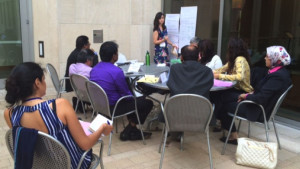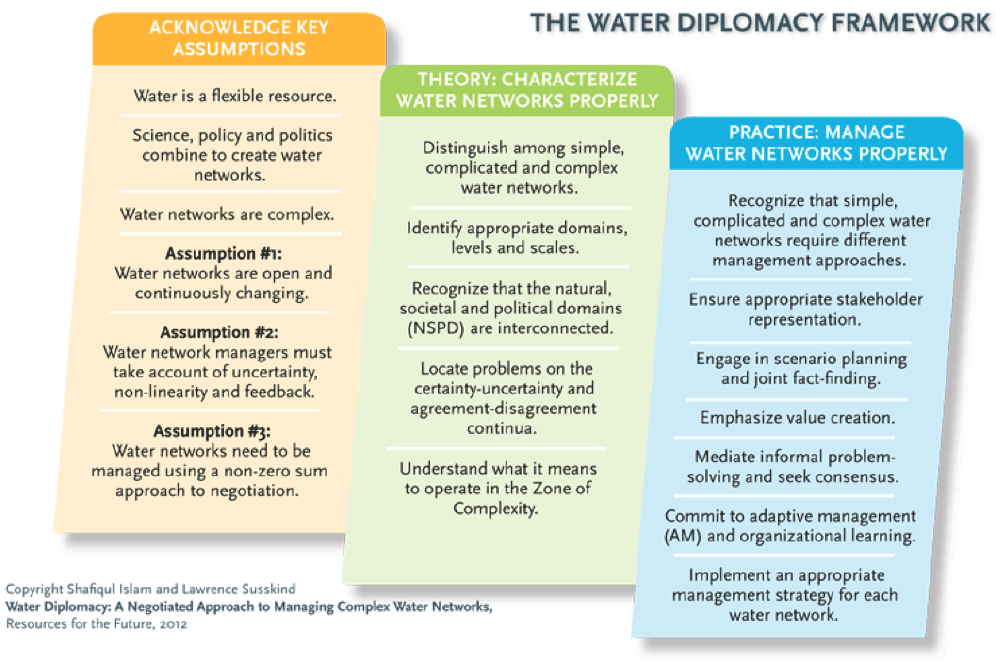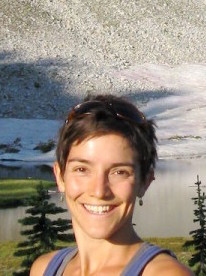By Danya Rumore for EDRblog.org

Throughout the western US, drought conditions have made water a pressing issue on many people’s minds. While the water shortage problem is clear, the solutions are not.
But the reality is that there’s only so much we can do because there’s only so much water. Right?
Yes and no. Physically speaking, there is only so much water on this planet. However, when it comes to the services and functions that water can provide, we cut ourselves short by thinking of water as a fixed resource rather than a flexible one.
For example, water re-use systems can allow the same drop of water to provide multiple services before it re-enters the biophysical hydrological cycle. Effective water trading systems that allow people to permanently or temporarily buy and sell water access entitlements can reward and encourage water savings in areas that otherwise may be incentivized to use as much water as possible by “use it or lose it” policies, thereby expanding the actual benefits created by water use.
Thinking about water as a flexible resource can also be helpful in places where too much water is an issue. For instance, in coastal New England communities, better coordination within and among jurisdictions can mitigate flooding risk by reducing the amount of water in a given place at a given time, such as through implementation of water detention systems, green roofs, and other forms of “low impact development” upstream from flood prone areas.
Such approaches and solutions can only be realized when people work together to create mutual gains – to expand the proverbial water pie. This is why water managers and professionals from around the world attend the Water Diplomacy Workshop in Cambridge, Massachusetts every year.
Hosted by Tufts University and the Massachusetts Institute of Technology, the Water Diplomacy Workshop is an immersive 5-day seminar aimed at building the capacity of individuals to apply a more diplomatic, mutual gains approach to water management. It teaches the principles of the water diplomacy framework, as described in Shafiquil Islam’s and Lawrence Susskind’s (2012) book Water Diplomacy: A Negotiated Approach to Managing Complex Water Networks.

Figure 1: The Water Diplomacy Framework, from Islam and Susskind (2010) Water Diplomacy: A Negotiated Approach to Managing Complex Water Networks [1]
During the workshop, we engage participants in thinking about how to create value in water management through negotiated solutions and collaborative problem solving. We also train participants in the skills and practice of mutual gains negotiation, facilitation, and mediation. The workshop emphasizes experiential education, involving case-based learning and a multi-day role-play simulation that challenges participants to apply the water diplomacy framework in a mock decision-making exercise. The workshop also focuses on peer-to-peer learning, with the intent of creating a community of practice and a network of “water diplomats” that will continue on well after the workshop. Further, a goal of the workshop is to train the trainer – to prepare people to go back to their organizations and companies to train others in the skills and theory of water diplomacy.
Two weeks ago, we ran the Water Diplomacy Workshop for the fifth year in a row. Despite having been involved with the workshop for a number of years, I was still amazed and inspired by the sense of empowerment and optimism that our 30 participants (from almost 20 countries) left with after the intensive week together. Some said the workshop provided them skills and toolsets they can use to tackle and make headway on the seemingly intractable water conflicts and challenges in their countries. Other participants said the workshop entirely shifted their way of thinking about water management and how to address emerging water conflicts. All seemed enriched and invigorated by the opportunity to share their stories and learn from each other, and to join a community of practice seeking to advance mutual gains approaches to water management around the world.
As I now transition my work and practice to a focus on the intermountain west, I cannot help but wonder whether training regional stakeholders in more diplomatic approaches to water management might help us tackle the ongoing water shortage. Perhaps “diplomacy” is not just a skill for international relations, but something we should think about at the local and regional scale?
 Danya Lee Rumore is the Associate Director of the Environmental Dispute Resolution Program in the Wallace Stegner Center and a Visiting Assistant Professor in the Department of City and Metropolitan Planning at the University of Utah. She holds a Ph.D. in Environmental Policy and Planning from the Massachusetts Institute of Technology (MIT).
Danya Lee Rumore is the Associate Director of the Environmental Dispute Resolution Program in the Wallace Stegner Center and a Visiting Assistant Professor in the Department of City and Metropolitan Planning at the University of Utah. She holds a Ph.D. in Environmental Policy and Planning from the Massachusetts Institute of Technology (MIT).
[1] http://waterdiplomacy.org/site/wp-content/uploads/2010/12/Water-Diplomacy-Framework.png
